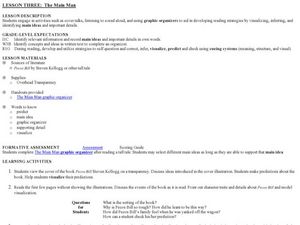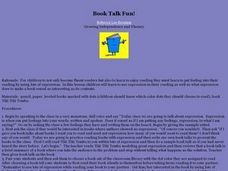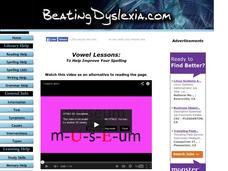Core Knowledge Foundation
Fairy Tales Tell It Again!™ Read-Aloud Anthology
A read-aloud anthology explores the fantasy worlds of fairy tales. Thirteen lessons challenge scholars to listen to and discuss a text, complete word work, then participate in extension activities—assessments and culminating activities...
Core Knowledge Foundation
The Human Body—Building Blocks and Nutrition Tell It Again!™ Read-Aloud Anthology
A read-aloud anthology explores the human body. Over three weeks, second graders listen to and discuss texts related to the cells, tissue, organs, digestive system, excretory system, nutrients, and a balanced diet. Learners practice word...
Curated OER
The Main Man
Students explore visualizing stories by completing a graphic organizer. In this reading strategy lesson, students read the story Pecos Bill by Steven Kellog and identify the setting, main characters and their interpretations. Students...
EngageNY
Talking with My Peers: Carousel of Reading Superheroes Around the World
In many places in the world, people go to great lengths to get books to read. This beginning-of-the-year activity uses pictures of people reading in extraordinary situations to stimulate effective listening and speaking using the...
EngageNY
TASC Transition Curriculum: Workshop 15
What do a cheetah, Audi commercial, and air have in common? They're all topics of an engaging inquiry-based, hands-on workshop for educators about background knowledge, reading strategies, the CER model, and argumentative writing. The...
Curated OER
Sentence Completion 5: High-intermediate Level
How do you figure out what word best completes a sentence? The answers and explanations key that accompanies an eight sentence exercise outlines the strategies used to determine the correct response for assessments of this type....
Teaching Tolerance
Social Media for Social Action
Engage in activism, not slacktivism! Scholars discuss social media and the Internet as tools for social change. Next, they engage in a close reading strategy called Thinking Notes as they read an article about social media activism.
Teaching for Change
A Documents-Based Lesson on the Voting Rights Act
How did the Voting Rights Act affect the daily lives of American citizens? A document-based lesson developed by the Student Non-Violent Coordinating committee (SNCC) presents a case study of the impact of the Voting Rights Act of 1965 on...
Curated OER
Reading Rainbow
Beginning readers observe and demonstrate a variety of reading expression strategies. They listen to the teacher read the book Ten Hungry Monsters both with and without expression, and discuss the difference. Then it's their turn! Have...
Curated OER
Close Reading
Eleventh graders read and study Hamlet. Then they are introduced to close reading as a means of understanding what is being read--not only understanding the printed word, but also the nuances and connotations of language as it is used by...
Curated OER
Book Talk Fun!: Growing Independence and Fluency
Master reading fluently and with emotion and expression! Young learners read and reread the book Tiki Tiki Tembo by Arlene Mosel to practice this strategy. The remark on the end punctuation to help them decide how to read the sentence.
Curated OER
Guided Reading with Jazz Baby
Jazz music and musicians are the focus of this language arts lesson. Young readers independently read the book Jazz Baby. To build fluency and independence they read silently, but are guided by directive comments from the teacher. They...
Curated OER
Introduce: Comprehension Strategy: Comprehension Monitoring
Help readers develop awareness of comprehension issues and employ tools for better understanding. The best way to begin this strategy is to model it through a think aloud. Choose a book scholars will also be reading, preferably one they...
Curated OER
Comprehension Strategies: Drawing Inferences
The proof is in the details! A richly detailed plan provides clear examples of how to draw inferences from text and how to provide support drawn directly from the text.
Curated OER
Tunes for Bears to Dance to: Graphic Organizer Strategy
"What are Henry's options?" "What do you think Henry will do?" To better understand the central conflict for the main character in Robert Cormier's Tunes for Bears to Dance to, class members engage in a compare-and-contrast activity that...
Curated OER
Using Wordless Comics To Help Create Meaning in Reading
Use picture cues as a tool in order to create meaning along with text. With a wordless comic, young illustrators discuss the main idea and character traits, and independently write a summary for a page of a wordless comic. This strategy...
EngageNY
Advanced Factoring Strategies for Quadratic Expressions (part 1)
Factoring doesn't have to be intimidating. Build on prior knowledge of multiplying binomials and factoring simple trinomials to teach advanced factoring of quadratic expressions with a lesson that uses various methods of exploring the...
Curated OER
Unit 1: Water is Life: The Heart and Science Behind this Phrase
Water, water, everywhere — but will there be enough to drink? Check out these detailed lesson plans to meet NGSS water cycle and CCSS literacy standards in your science classroom. Learners do a close reading of a challenging, poetic text...
Meadows Center for Preventing Educational Risk, University of Texas at Austin
Lesson 12 - Ed Suffix with Unchanging Base Words
Understanding different verb tenses begins with knowing how to decode words. A lesson on the -ed suffix with unchanging base words introduces readers to the past tense. Teachers present the skill with oral reading and spelling...
K20 LEARN
Lord of the Flies Unit, Lesson 1: I'm A Survivor
What three readily available things would you grab in case of an emergency? That's the question that launches a unit study of William Golding's The Lord of the Flies. After sharing their choices, class members read Golding's rationale...
Meadows Center for Preventing Educational Risk, University of Texas at Austin
Lesson 9 - Contractions
Is it do'nt or don't? How about doesn't or does'nt? A activity on contractions helps learners identify, form, and use contractions. Components within the plan include direct instruction on decoding and encoding contractions, as well as...
Curated OER
Vowel Lessons: To Help Improve Spelling
There are a few things every good speller knows: spelling rules, vowel sounds, and word endings. Help your learner with dyslexia become a more efficient speller with a few tips from a dyslexia expert. Included in the lesson is a video,...
BrainPOP
Civil Rights Lesson Plan: Tracking History Through Timelines
Use the accompanying assessment to determine your class's prior knowledge on Martin Luther King, Jr. before beginning a lesson on the famous civil rights movement leader. The resource has young historians thinking about life for African...
EngageNY
Notices, Wonders, and Vocabulary of the Third Stanza of “If”
How does one's experience reading a poem's text differ from listening to its audio version? Delve into the insightful question with the poem, If by Rudyard Kipling, as pupils compare and contrast their experience using a note-taking...

























